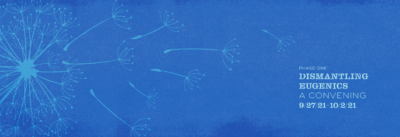About the event
Dismantling Eugenics is a high-impact, 6-day event in Fall 2021 that will convene a multi-disciplinary group of scholars, educators, scientists, philanthropists, journalists, activists, curators, creative producers, community members, and advocates to envision and work towards an anti-eugenicist future. It acts as a counter-centennial for the Second International Eugenics Congress, held at the American Museum of Natural History a century ago, which furthered the politics of exclusion that continue to operate in our society today. Dismantling Eugenics is supported by the generosity of the Ford Foundation, the Robert Wood Johnson Foundation, the W.K. Kellogg Foundation, the MacArthur Foundation, and partnerships with the American Museum of Natural History – NYC, University College London, the Clement A. Price Institute, Rutgers University-Newark and The Public History Project.
Eugenics and Anti-Eugenics
The practice of eugenics applied supremacist ideas to a wide range of hard and social sciences and public policies. Eugenics became popular and influential in the United States, Great Britain and globally from the 1880s to the 1930s. These ideas, while eventually discredited, percolated through history and culture (most infamously contributing to Nazi ideas for ensuring racial purity), and have emerged again in the social and political crises of the early 21st century. Eugenicist logics still undergird much of the inequality and challenges we experience today, and which have been painfully exposed in our current political and pandemic moment. It is clear that a renewed and collective effort needs to be made to address the deep-rooted structure of this belief system. Anti-eugenics is a shorthand for anti-racism, anti-ableism, anti-sexism, anti-homophobia, decolonization, etcetera; embracing difference and diversity; and a commitment to pursuing equitable and just futures. The Anti-Eugenics Project will give the challenges of the current moment important context, and create new awareness, urgency and avenues for public reconstruction.
